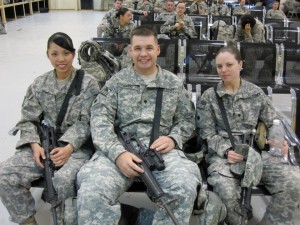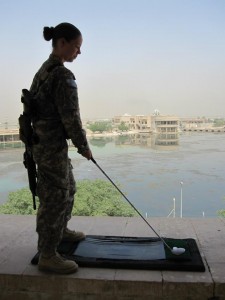Jesse Basinski, Associate Structural Engineer in the Las Vegas, Nevada office joined MWH as an intern in 2013 following her service in the Army. She recounts her transition from the military to working in the private sector and her experience as an intern, now a full time employee at MWH.
I was born in Maine, but my parents were both Navy Seabees so we moved around quite often. I like to call Virginia my home because I spent the majority of my school years there after my parents retired from the Navy. After I graduated high school, I started in construction in Virginia and worked as a field engineer while attending college part time. The major benefit for me to join the Army was to earn the GI Bill, but I also needed a job after the economy tanked and the construction industry wasn’t doing so hot. It wasn’t until after I joined the Army and moved to Las Vegas, where I have family, that I was able to finally finish my civil engineering degree at UNLV. I have 2 years of active duty time and 3 years’ time as a National Guardsman in drilling status.
I joined MWH in 2013 as an intern and became full time staff this year. Initially, MWH was the only engineering firm looking for interns and since I wanted to learn more about the environmental side of civil engineering, it was an easy choice for me to apply. After interviewing, I decided that the Las Vegas office was particularly interesting to me because of the staff and how easy and fun it was to learn from them as an intern. I immediately got along with everyone really well. I love the Las Vegas office. It’s a combination of things that make me love working here, but having other veterans in the office certainly helps.
It’s hard to believe when they tell you as you get out of the Army - or when you come back from a deployment to a combat zone - that you no longer think or even act like a regular civilian person, but it’s true. For me, I became accustom to regular routine and working with the same people every day who followed the same standards that I did, so making the transition out of the Army was a bit stressful when I look back at it. I think when veterans transition to a more civilian lifestyle, we notice that everyone around us doesn’t live to the same standards that we lived by as active duty, and this can make us seem impatient or a bit stressed. Believe it or not, joining MWH as an intern actually helped me adapt. The intern program in Las Vegas requires interns to socialize with engineers to get tasks, and this helped me learn to think more like the people I was working with. I also like to think that the Las Vegas office has a high standard for work ethic and quality, so that certainly sat well with me early on.
An important thing that I also learned in the Army was to speak up when something didn’t seem quite right to me. This may have been something that the Army has adopted in its training only in the past decade, but I’ve found it valuable. In my role as an associate engineer, it seems often appreciated when I point out that something is unclear in a design or when I present an alternate idea, even if it turns out not to be the best idea. People can always count on me to point out an issue or speak up honestly, and I attribute this to my military experience.
If I could give any returning service members or veterans advice when looking into a career in Engineering, Consulting or Construction, I would tell them to use the GI Bill and get a degree.
MWH Global recently announced plans to participate in the nationwide Joining Forces initiative, aimed at supporting service members through wellness, education and employment opportunities. For career opportunities visit www.mwhglobal.com/careers .



